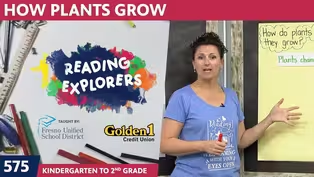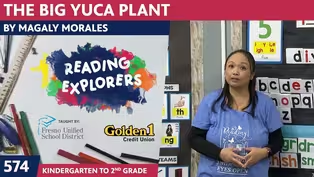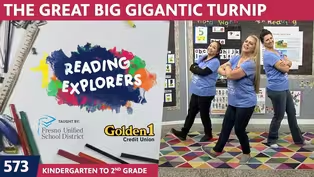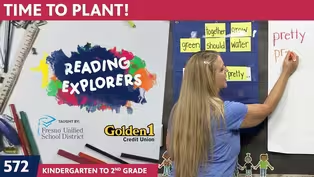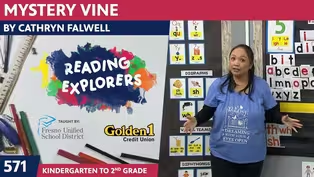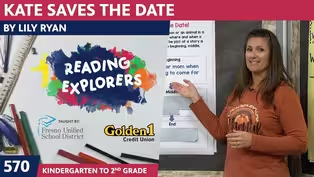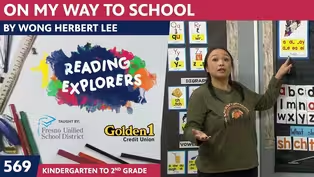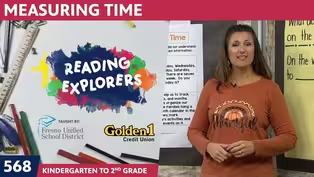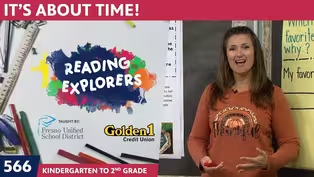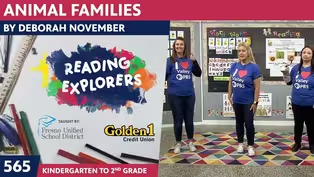
3-334: Identifying Clauses & Features of a Poem
Season 3 Episode 184 | 14m 12sVideo has Closed Captions
Join Mrs. Nix at Camp Discovery!
Third Grade teacher, Mrs. Nix, welcomes students back to Camp Discovery, a fun learning space packed with reading adventures & fun games!
Problems playing video? | Closed Captioning Feedback
Problems playing video? | Closed Captioning Feedback
Reading Explorers is a local public television program presented by Valley PBS

3-334: Identifying Clauses & Features of a Poem
Season 3 Episode 184 | 14m 12sVideo has Closed Captions
Third Grade teacher, Mrs. Nix, welcomes students back to Camp Discovery, a fun learning space packed with reading adventures & fun games!
Problems playing video? | Closed Captioning Feedback
How to Watch Reading Explorers
Reading Explorers is available to stream on pbs.org and the free PBS App, available on iPhone, Apple TV, Android TV, Android smartphones, Amazon Fire TV, Amazon Fire Tablet, Roku, Samsung Smart TV, and Vizio.
Providing Support for PBS.org
Learn Moreabout PBS online sponsorshipMore from This Collection
Valley PBS and Fresno Unified School District have partnered with Golden 1 Credit Union to create Reading Explorers Lessons for grades Pre-Kindergarten through Third grade. The daily lessons will be taught by Fresno Unified School District teachers and are created to help students practice their reading skills and reinforce lessons during distance learning.
Video has Closed Captions
Learn about the life cycle of a plant on Reading Explorers. (26m 39s)
K-2-574: The Big Yuca Plant by Magaly Morales
Video has Closed Captions
Join the Reading Explorers as we adventure into a new book The Big Yuca Plant. (26m 30s)
K-2-573: The Great Big Gigantic Turnip
Video has Closed Captions
What will happen at The Great Big Gigantic Turnip? (26m 30s)
K-2-571: Mystery Vine by Cathryn Falwell
Video has Closed Captions
The Bell has rung and the Valley PBS Classroom is open once more. (26m 32s)
K-2-570: Kate Saves The Date by Lily Ryan
Video has Closed Captions
Mrs. Nix, Mrs. Hammack and Mrs. Vang are glad to have you join her for a new day. (26m 32s)
K-2-569: On My Way To School by Wong Herbert Lee
Video has Closed Captions
Mrs. Vang is ready for a new day of phonemic awareness and reading comprehension. (26m 40s)
Video has Closed Captions
We review phonics, frequency words and more on Reading Explorers. (26m 45s)
K-2-567: Nate The Snake Is Late
Video has Closed Captions
What happens when Nate the Snake is late to school? (26m 49s)
Video has Closed Captions
It's time for school! How do you know what time it is? (26m 31s)
K-2-565: Animal Families by Deborah November
Video has Closed Captions
Welcome to the Reading Explorers lessons in the Valley PBS Classroom. (26m 14s)
K-2-564: From Caterpillar To Butterfly
Video has Closed Captions
The transformation from Caterpillar to Butterfly is a special one. (26m 52s)
Providing Support for PBS.org
Learn Moreabout PBS online sponsorship♪ Good morning to a brand new day ♪ ♪ Time to learn and games to play ♪ ♪ Learning things is so much fun ♪ ♪ Learning is good for everyone ♪ (soft music) - Good morning third grade.
My name is Mrs. Nix, and I am so excited to be here with you to support you as you become amazing thinkers, readers and writers.
This morning, I have another email.
I'm so excited to get all of these emails.
Now this one's from Jensen, and I can tell that Jensen was having his family help write the email.
And so here's what it says.
It says, "Jensen's in third grade and is eight years old, "and wanted to thank me because he's learned verbs, "adjectives, pronouns and nouns on Reader Explorer."
So Reading Explorer, just right here at PBS.
And then it says right here there's a little note from mom and dad.
It says, "I love when my kids get a choice "to watch something on TV, they choose Valley PBS.
"From Wild Kratts, "to NOVA Exploring Indestructable Molecules, "we are so grateful."
And you know what?
We're so grateful that you're here watching with us.
This is why we do what we do, right?
And because I have this email, guess what Jensen's gonna get in the mail?
This handy dandy little activity workbook.
And how do you get one?
See that address that's popping up on the screen?
All you need to do is be like Jensen and his family and send me either an email or a letter in the mail, and I'll put one of these in the mail for you.
So thank you for your kind words of encouragement, we love getting some mail from you and we love what we're doing and helping our community.
So, third grade, couple of things that I just want a quick little shout outs.
If you're looking for a book to read, check them out, visit your county library, or go online and check out a book through Sora.
Here in Fresno Unified, we've been counting down our top five schools for Sora checkout.
And in second place today, we have.
It's stuck, I can't get it out.
Here it is.
Roosevelt High School.
So great job Roosevelt.
You guys have been checking out your books and you've made it onto our top five schools for the most checkouts.
How do you get yourself on there?
It's super easy.
Check out some books, tell a friend, maybe a couple of classmates, and you can get your school up on our Sora countdown.
Okay, third grade let's talk about and think about getting started this morning.
I really have, we've been talking and practicing all week poetry.
So we're going to continue going through with our poems.
And then we're going to finish up with a little practice with some grammar.
You ready to start?
Okay, let's warm up those brains.
Looking at these high-frequency words, these are our words that we've been practicing the last five weeks.
So we're going to just jump all the way down here because today is Thursday, and we're going to read these 10 words together, and I know that you're going to do a fantastic job.
Are you ready to start?
All right, let's do it together.
Here we go.
Sing, sleep, she, show, seven, shall, say, see, saw and small.
Nicely done.
Now we're all nice and warmed up today, right?
Okay, let me move this out of the way because I want us to talk about poems today.
So features in a poem.
Remember, let's talk about all the things that we want to make sure are in there.
A poem expresses feelings and ideas.
It often is organized into lines or in stanzas.
It may use rhyme and rhythm.
It uses figurative language, such as similes and metaphors.
And then uses descriptive words that appeal to the reader's senses.
What can you see, hear, smell, taste, touch?
All of those are parts of a poem.
Okay, we've been looking at that writing process, so I'm gonna pull this back over here.
And remember a writing process is plan, draft, revise, edit, publish.
Even though we're doing a poem this week, we're still going to go through that same writing process.
So, we planned our poem, we wrote a rough draft of that poem.
Yesterday we started to revise that poem, because not everything was rhyming, and it wasn't exactly how our ideas were.
Today is editing.
And editing is a little bit different.
This is where we're going to start talking about spelling and grammar and things like that.
So let's talk about it.
This is where we're going to proofread and we're going to edit.
We're correcting mistakes in spelling, punctuation, capitalization and grammar.
Now, here's a caution.
So if you've typed it up, you definitely could use a spell check on your computer.
But sometimes it doesn't always recognize wrong words, such as the word there, T-H-E-R-E, when you mean they are.
So if you put in the contraction.
Because the computer is going to think, ooh, that word is spelled correctly.
But it's the wrong word.
Remember we were practicing homophones the other day.
And so words that sound the same.
So if you've spelled it correctly, but you have the wrong one on there, it's gonna not catch it.
So this is where having a peer review it and use that editing checklist which we're going to talk about in just a second, is super helpful, because they can catch something that a computer can't.
All right, and then finally, once you get your poem back, or your story that you're working on, then you're going to go through and you're going to fix any of those errors that were talked about.
Let's talk about how to do that.
So, when you hand it over to a peer or a family member to help you do some editing, here are some things that they're going to look for for you.
And they're even things that maybe you're just as you're going through and you're reading it again, considering and thinking about.
So, do helping verbs and the verbs they describe, do those agree?
We talked about helping verbs the other day.
Do all proper nouns begin with capital letters?
So we want to make sure that all of our capitalization is correct.
Are apostrophes used correctly?
Are we using them because we're trying to write contractions?
Are we showing possession?
Are we using those apostrophes correctly?
Are the inflectional endings, such as -ed added to words correctly?
And are all words spelled correctly?
Okay, let's go through and look at our poem that we've been working on this week.
Okay.
So this is about "The Carnival."
Let's go through, let's read it, and then let's see if we can find some of those errors.
So this one's called "The Carnival," and here we go.
The carnival came when I was 10.
I went two times then went again.
A ride were spinning called Wheel and Top.
Arms like an octopus climb and drop.
I scrambled on to take a ride.
The music played its tunes inside.
Okay, I'm going to stop there, 'cause that's our first stanza.
Remember we were talking about stanzas and lines.
And I want us to stop and think, did we find anything here maybe that, thinking about capitalization, because I saw something.
All right.
A ride were spinning called Wheel and Top.
Is that the name of the ride?
What do we do when something is its name?
Yes, we have to make sure that we capitalize Wheel and Top.
So that I remember that I want to make sure on my final draft that I capitalize it, I just put three lines underneath of each of those words, and that reminds me, I've got to capitalize Wheel and Top.
Good, but I'm going to go back here just a little bit.
A ride were spinning called Wheel and Top.
Hm, that doesn't sound right.
That verb is definitely the wrong one.
What should I have?
A ride was spinning.
A ride was spinning called Wheel and Top.
Arms like an octopus climb and drop.
Okay, that makes more sense.
Okay.
I scrambled on to take a ride.
The music played its tunes inside.
Is this the right?
So, oh no it's not because if I were to break this into a contraction, what would it say?
The music played it is tunes inside.
Do I want it to have an apostrophe?
No.
So, I'm going to go through and I'm going to fix that one too.
Does not need an apostrophe.
Alright, good eagle eyes.
You're doing a great job.
Okay, let's read the second stanza.
The carnival came when I was 10, I went two times then went again.
Hot dogs.
Ooh, did anyone catch that pretzels was spelled wrong?
Again, good job with your eagle eyes right there.
We forgot that T. I'm just going to squeeze it in there.
See that little carrot.
It means that the T needs to go there.
Hot dogs, pretzels, apples too.
So much fun, too much to do.
Look, your computer would not catch this because that is the wrong too.
When you have too much to do, you want it to be T-O-O, it's that homophobia we've been practicing.
So let's make sure we get the right one there.
So much fun, too much to do.
I wandered home tired and dazed as the lights behind me sparkled and blazed.
Wow, that is a fantastic job third grade.
We just went through and we just did editing, and we did our revisions yesterday.
What do you think is going to happen tomorrow?
Ah, yes, we're going to go through and we're going to look at that final draft.
So tonight, as you're going through yours, think about your spelling, your grammar, making sure that your verbs are correct, and that you're using the correct forms of words.
So thinking about those homophones.
All right, last little bit, I've got a couple of minutes here.
I want to make sure that we talk about now.
Clauses, we're going to talk about some complex sentences.
So a clause is a group of words that has a subject and a verb.
Now there's a couple of different types of clauses.
So there's independent and dependent clauses.
Now an independent one is just that, it can stand alone and it's its own sentence.
But a dependent clause can't.
It's got a hangout with some other dependent clauses.
So, let's go through and we're going to decide if these are independent clauses.
We're going to circle yes or no if it is.
So if you've circled yes, it means that it's independent.
So let's go through.
Essentially, we're looking, is it a complete sentence?
Okay.
My dad works at a pet store.
Does that have a subject and something that our subject is doing?
Yeah, my dad, what does he do?
He works at the pet store.
It's a complete sentence.
Yeah.
So we're going to say it's an independent clause.
Takes care of the fish and reptiles.
Hm.
Well, who takes care of the fish and the reptiles?
So do I have a subject?
No.
So it's an dependent clause.
So no, that's not a complete sentence, right?
Many people visit the pet store.
Okay, who is this about?
Many people.
What do they do?
Visit the pet store.
Is that a complete independent clause?
Yes it is.
Perfect.
Last one.
People who want to buy pets.
Well, people who want to buy pets.
Hmm.
That doesn't sound like it's a complete thought.
So do we need more?
Yeah.
So it is a dependent.
All right.
Awesome job.
So, I want to say thanks so much for hanging out with me today as you're getting ready for school.
Remember, you are responsible for your learning success.
So ask those questions, share your ideas and listen.
Because together, we can do so much more.
I can't wait to see you back here tomorrow where we can finish up our poems.
Have a great afternoon.
Do your best.
I'll see you here tomorrow.
Take care, bye bye.
♪ Good morning to a brand new day ♪ ♪ Time to learn and games to play ♪ ♪ Learning things is so much fun ♪ ♪ Learning is good for everyone ♪
Support for PBS provided by:
Reading Explorers is a local public television program presented by Valley PBS
